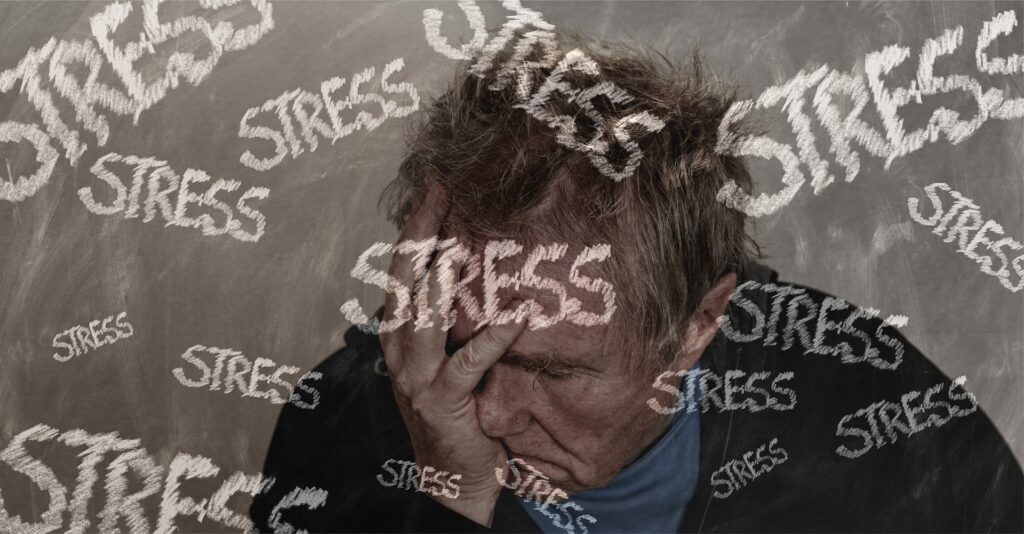You might have exclaimed: ”Gosh, I’m so stressed!” at some point because you had a lot to do. However, stress and busyness are far from the same, and it is important to know the difference. The consequences of stress and the consequences of busyness are very different, with the first-mentioned having potentially fatal consequences for your health. But what is stress really, and how does it feel? And is stress solely a bad thing? These are some of the questions we will try to answer in this blog entry.
What is stress?
In the public debate, stress is often referred to as a common disease. However, stress is not a disease. In reality, stress is a strain in your body, that creates an imbalance. You are not born with this imbalance. It is created because you are experiencing demands that are greater than your capabilities – or the capabilities you believe you have. A demand can be work-related, like an extensive task from a superior, or the demand can be in your personal life. Often, it is about time and in many situations the lack hereof, but it can also be about your economy or that your physical or mental energy reserves are low. These factors are extremely subjective, as especially an energy reserve can vary from person to person. Because of this, it is impossible to say with certainty how much or how little you can handle, and this is why it can be very hard to know exactly when a strain turns into an imbalance in your body.
Stress can be beneficial for you – in small doses!
Although words like “imbalance” and “stress state” do not sound so nice, not all stress is unhealthy for you. A state of stress can help you to react and act appropriately in extreme situations. The key word in this context is the length of the stress period. Biologically, stress is beneficial to the body approximately the first hour, after which the beneficial effect ceases. The most important thing here is that the stress-inducing requirement (e.g. an annual status report at work or an impending move in your private life) is clear to you and is time-limited.
When we state the above, a lot of people say: “Well, I can not be stressed out by my private life!”. But that is actually quite likely to happen. A lot of people think that stress is caused by an excessive workload in the workplace. But our experience shows that the load is often 60/40, where the unmanageable demands at home account for 60% of the load, and the unmanageable demands from the workplace account for the remaining 40%.
How does stress feel?
Stress symptoms can vary from person to person, and therefore it can also be difficult to know for sure if your symptoms are due to stress or stem from another cause. However, we are seeing an increasing number of stress diagnoses in society, and because the uncertainty regarding the cause of the symptoms is so big, there is a large share of people who can go for a long time without taking action. If you have symptoms, it is therefore important to find out what the causes of the symptoms may be. Symptoms can manifest themselves physically, mentally and in your behaviour. Below we have compiled some of the primary symptoms that you may experience if you are stressed:
Physical symptoms:
– Inner turmoil
– Headache
– Rapid heartbeat
– Abdominal pain
– Decreased potency
– Weight loss
– Frequent infections
– Exacerbation of chronic diseases
Mental symptoms:
– Reluctance
– Fatigue
– Irritability
– Memory loss
– Difficulty concentrating
– Anxiety
– An impaired sense of humour
– Depression
Behavioural symptoms:
– Insomnia
– Disengagement
– Hyperventilation
– Aggressiveness
– Decreased performance
– Indecisiveness
– Increased use of stimuli
– Increased sickness absence
As you can see, there are many of the symptoms that you probably already experience occasionally in your daily life. Symptoms such as inner turmoil, instability and indecision are something we have all experienced from time to time and it is therefore essential that you assess the type and degree of the symptom. And to make matters worse, all of the above symptoms can have a cause other than stress, which is why it often takes a long time before a person with stress seeks help.
Some of the more severe symptoms like persistent stress-related headaches, weight loss, memory problems, anxiety and depression are symptoms that will impair your ability to function in your daily life and thereby stress you further. Therefore, these represent some more serious symptoms that you should take seriously and immediately seek help to deal with – regardless of whether it is stress-related or due to another cause.
What creates your stress state?
It would have been quite easy if there was just one answer to this question. The truth is, however, that there can be many reasons why your stress state is persistent and has now given you stress symptoms. However, our many years of experience with stress have taught us that it is often the following causes that underlie stress:
- Poor self-esteem: Do you often experience the feeling of not being good enough – either at work, in private or in both places? And is it your emotions rather than your common sense that makes you feel less worth? If you can answer yes to both questions, then this may be a clear cause of your stress symptoms.
- Lack of cohesion: Do you often feel alone? Both in general and in connection with your daily tasks? This feeling can also occur both at work and in private and can be a cause of your symptoms.
- Poor communication: We have written a longer section about communication or lack of the same in the blog post “Is your colleague suffering from stress?”. Here you can read a summary of how poor communication can manifest itself:
- inside yourself: do you not feel that you are radiating what you feel you stand for? Do you feel a little out of balance?
- in your assignments: Do you often find that there would be far fewer misunderstandings and frustrations if you had a spin doctor to handle all your communication with your surroundings so that it was translated into a language the surroundings can understand?
We hope this post has helped to make you more aware of what stress is.
If you are already feeling symptoms, click here and read our self-help guide for dealing with incipient stress.




